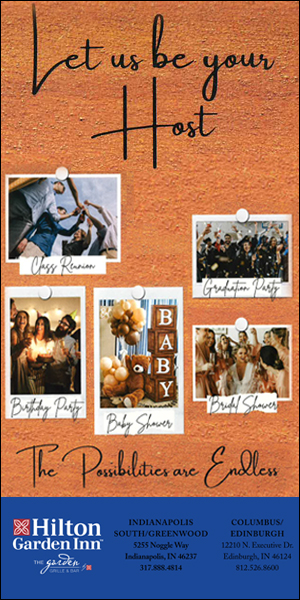
Dr. David Dunkle doesn’t see problems,
only people who need his help
During spring break of his freshman year at Franklin College, David Dunkle noticed that he was feeling weak. When Dr. Douglas Bullington met with the 19-year-old to share the results of his blood tests, it was a solemn and life-altering event for both of them. The tests revealed Dunkle had cancer. At one point, the basketball player was given a 10 percent chance of seeing his 21st birthday.
But a playbook full of science and care can yield miraculous outcomes. Following several months of chemotherapy, Dunkle started on the 1991-92 Franklin College basketball team, which had a 25-4 record and advanced to the National Association of Intercollegiate Athletics Elite Eight.
Dunkle would go on to graduate in 1994 from Franklin and attend Indiana University School of Medicine. He now works as a family doctor at Johnson Memorial Health’s Family Medicine Specialists in Franklin and JMH’s Stones Crossing Health Pavilion in Greenwood. He has special training in population health management, preventive medicine, concussion management and hyperbaric oxygen treatments; he regularly performs joint injections and lesion biopsies.
Even before his cancer battle Dunkle, who also serves as vice president of medical affairs for the hospital and vice president of the board of the Johnson Memorial Hospital Foundation, had wanted to be a family physician.
“I’m a people person and a pretty outgoing guy,” he says. “I just really thought I could have the most personal interactions as a family doctor. Also, to be honest, I like the lifestyle. I always planned to have a family. Work-life balance was important to me, especially with my love of athletics, that I just felt family medicine was for me.”
While it’s not always easy, he says he makes an effort to keep work at work, spending the time before and after work with his family at their home in Center Grove. His wife, Amy Dunkle, is a Title I teacher in Center Grove schools. They have a 14-year-old son, Evan, and 12-year-old daughter, Reese.
Dunkle decided to pursue medicine for the challenge. “I thought you had to take very hard courses starting in high school to prepare yourself for college, to get on the pre-med track. And then medical school is very intense,” he says. “So I think that’s what drew me to it. I looked at it as a challenging field. And I looked at it as lifelong learning. Medicine is an evolving field, and you have to stay up with most current treatments and medications. I really do enjoy that.”
A partnership of compassion
At JMH’s Family Medicine Specialists, Dunkle works with a familiar face: Bullington. Now both a little older and wiser, they work side-by-side.
“From the moment we first met, even though it was a serious event, it was probably a lucky moment in my life to be able to establish a relationship with someone who has made my practice as a physician that much more enjoyable just being around him,” Bullington says.
It was Dunkle’s experience as a patient that helped drive how he now interacts with his own patients. “I honestly think that spending so much time as a patient definitely made me a better physician,” he says. “Too often in medicine, I think we say, ‘Do this test, do this,’ without really explaining it. That was one of the things that drove me crazy as a patient: ‘Why do you want me take this medicine?’ ‘Why do you want me to take this test?’ I probably drove my physicians crazy by asking so many questions.”
As Dunkle navigated those frustrations as a patient, he developed a bedside manner couched in empathy, Bullington says.
“He looks at them as not a problem to be solved, but a person with a problem,” Bullington says. “He has a sense of humanity when it comes to working with the patients. It’s so easy to get into a mindset of ‘This is problem, how do I solve it?’ But he looks at this as a person. How do I help this person deal with the problem and how do I help the person feel better? It’s a big distinction in medicine.”
It’s an approach that’s well received by patients and by co-workers, Bullington says. Dunkle was named the 2018 Physician of the Year by his JMH peers and patients.
By working together in their practice, they’re both better doctors for it, Bullington says. Dunkle began his career watching Bullington, mimicking his mentor’s words and manner; that mirroring has taught not only Dunkle but also his mentor.
“I’ve learned that we think about things the same way. (We) could probably complete each other’s sentences,” Bullington says. “It’s gratifying. Oftentimes we don’t have the opportunity to stand back and look at ourselves, how we are and interact with people. He gives me a unique opportunity to see how he interacts, how he appears to others, and how I may appear to others.”
Call me coach
Dunkle has stayed in touch with his Franklin College basketball coach, now director of athletics and head men’s basketball coach, Kerry Prather. He remembers his former player fondly.
Prather says, “He was an overachiever. He worked extremely hard on the basketball court nonstop, just like he did academically. I remember getting back into shape was really challenging for him. First, the complete breakdown of his system while undergoing chemotherapy, then building his body back up to compete at this level.”
Prather recalls that for a brief time Dunkle expressed an interest in becoming a coach. Although he ultimately stayed with medicine, he coaches his daughter’s basketball team in Center Grove. “It’s a really neat thing he’s engaged with the kids,” Prather says. “All of the kids, not only his daughter, are lucky because he brings a lot to the game.”
Being well
Being an athlete shapes how Dunkle lives and how he encourages patients to live. A healthy lifestyle is a must: no smoking, watching their diets, getting enough exercise and overseeing the body from inside out.
To motivate his patients to adopt or maintain healthy lifestyles, he applies personalized strategies, looking for entry points to motivating the people around him.
“Your end goal is the same, but some people just need different motivation,” Dunkle says. “Some people will need a soft touch, some people need to be scared, some people just want the scientific studies quoted to them.”
He looks at his patients as family, telling them, “This is what I would do if you were my mom. This is what I’d tell you to do if you were my dad.” He also jokes that he often sees his patients outside the office, including encounters at restaurants where they will joke that they shouldn’t order dessert, but he’s also run into his patients at the gym.
“He is very interested in the aspects of athletic performance,” Bullington says. “I think he feels that his good physical condition when he was 19 helped him deal with a life-threatening issue. He realizes that no matter what the disease is, your body wants to fight. How well it fights is how efficient a machine it is. He looks at conditioning and wellness as a way to keep a body in as good of shape as possible, so when problems do occur, whether serious or minor, how your body interacts with the diseased state determines how you well you will do in that fight.”
Going forward, Dunkle hopes to continue his family practice, but also enjoys the administrative side of the work he does for the hospital. “Sometimes I can make decisions that positively impact lives of those who aren’t in my practice,” he says.
The JMH Foundation has helped improve access to health care services through funds raised at its gala; the third annual event is scheduled for Feb. 23 at the J.W. Marriott in Indianapolis.


